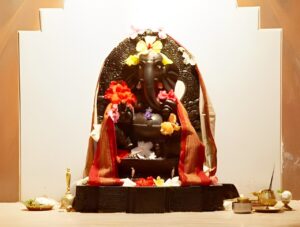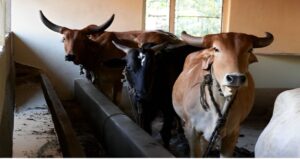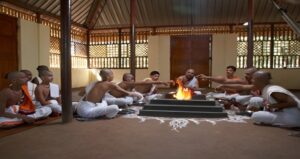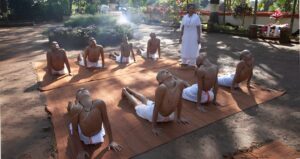







WELCOME TO
SHREE GANESH VEDPATHSHALA

As Modern India stands tall...
let us not forget our roots!
The Vedas are the original scriptures of Hindu teachings ( culture), and contain spiritual knowledge encompassing all aspects of our life.
Vedic literature with its philosophical maxims has stood the test of time and is even more relevant today, with the ever growing complexities of an uncertain changing world. For the sake of our future generations, it is imperative that the tradition of Vedic studies be reinvigorated.
The need for reactivation of Vedic Studies
For generations, the knowledge of the Vedas has been handed down by gurus to their shishyas by word of mouth. Even at the time of India’s independence, many DashGranthi Brahmins –scholars of the ten holy books of Vedic Studies – were imparting Vedic education, even in a small town like Deorukh in Maharashtra.
Sadly, their number is rapidly declining. As a result this immense body of knowledge is in danger of being lost to future generations.

About Vedas
Introduction to the Vedas
The Vedas are the oldest sacred texts of Hinduism, comprising four main collections: Rigveda, Samaveda, Yajurveda, and Atharvaveda. They form the foundation of Vedic knowledge, covering spiritual, philosophical, and ritual practices.
The Book of Shlokas
These hymns are dedicated to various deities and natural forces and reflect the spiritual, philosophical, and social life of early Vedic civilization.
The Book of Ritual
The Yajurveda combines prose and verse to articulate the procedures and mantras needed to achieve harmony between the physical and spiritual realms.
the Book of Songs
Its primary focus is on melodies and chants, and it is considered the foundation of Indian music and classical singing traditions.The Samaveda consists of hymns from the Rigveda.
The Book of Mantras
The term Atharvaveda combines Atharvan with Veda. It signifies a collection of knowledge associated with everyday life, healing, and spiritual practices.
The Book of Shlokas
These hymns are dedicated to various deities and natural forces and reflect the spiritual, philosophical, and social life of early Vedic civilization.
The Book of Ritual
The Yajurveda combines prose and verse to articulate the procedures and mantras needed to achieve harmony between the physical and spiritual realms.
Book of Songs
Its primary focus is on melodies and chants, and it is considered the foundation of Indian music and classical singing traditions.The Samaveda consists of hymns from the Rigveda.
The Book of Mantras
The term Atharvaveda combines Atharvan with Veda. It signifies a collection of knowledge associated with everyday life, healing, and spiritual practices.
The Book of Shlokas
These hymns are dedicated to various deities and natural forces and reflect the spiritual, philosophical, and social life of early Vedic civilization.
The Book of Ritual
The Yajurveda combines prose and verse to articulate the procedures and mantras needed to achieve harmony between the physical and spiritual realms.
Book of Songs
Its primary focus is on melodies and chants, and it is considered the foundation of Indian music and classical singing traditions.The Samaveda consists of hymns from the Rigveda.
The Book of Mantras
The term Atharvaveda combines Atharvan with Veda. It signifies a collection of knowledge associated with everyday life, healing, and spiritual practices.
Harmony of Tradition and Spiritual Learning

GOSHALA
As legends goes, Lord Daksha Prajapati having created the world, rested and refreshed himself by drinking some nectar.
Read More
His breath became fragrant and from this fragrance emerged a cow. The Lord aptly named her Surabhi. Blessed by Lord Brahma, Surabhi became and dwelled in a heaven of her own called GO-LOK. Her daughters reside in Go-Shalas on earth. Ved-Pathshala has its own Go-Shala, since all Vedic rituals need cow’s milk, curd, ghee and urine. As part of self reliance, students are taught to look after the cows including milking them. Soon the Ved-Pathshala plans to produce products from cow dunk and urine.

YADNYASHALA
A structure built as per the norms and proportion prescribed in the Vedas, It is believed that sacrifices made in the fire place (Homkunda) reach the Gods in heaven.
Read More
In return, the Gods grant us good, healthy lives. It’s also believed that the smoke created by the fire helps seed the clouds which bring us good rain and a good harvest. Yadnya Shala is a laboratory where students are made to learn and practice, under the guidance of their seniors.

YOGA
Yoga classes in progress. Yoga is the oldest philosophical wealth of our country.
Read More
The Rushi-Munis of the Vedic period got their inner strength, super knowledge and foresight, from yoga
